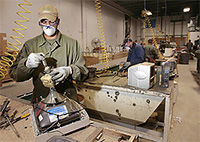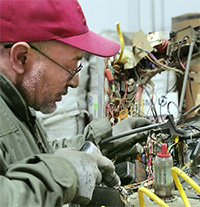Maine a model of e-waste disposal
by John Richardson, Portland Press Herald/Maine Sunday Telegraph
 |
 |
 |
 |
| |
 |
|
| |
Joel Cordero Rosa takes apart a computer monitor Wednesday at Uniwaste Services in Portsmouth, N.H. About 50,000 pounds of waste, or about 1,000 units, are trucked here each day from Maine and other states. (Photo by Gregory Rec) |
|
 |
 |
 |
| |
 |
|
| |
Sal Gonzales dismantles a television set at Uniwaste. E-waste contains hazardous materials that are problems if burned or buried. (Photo by Gregory Rec) |
|
 |
 |
 |
| |
 |
|
| |
Robert Nicholson talks about recycling fluorescent light bulbs, another Uniwaste service. Nicholson managed waste in nuclear power plants before starting Uniwaste four years ago. (Photo by Gregory Rec) |
|
 |
 |
 |
|
| |
23 March 2007 (Portsmouth, N.H.) –
This is the end of the line for most of Maine's old TVs and computer monitors.
It's a quick death. It only takes minutes for a crew of workers with screwdrivers and hammers to dismantle each unit and sort out the glass, copper, circuit boards, plastic and other "commodities" for the recycling market.
And it's a cleaner one. The hazardous ingredients -- lead, cadmium and mercury -- are recycled, too, instead of getting vaporized in incinerators or buried in landfills.
How to recycle so-called e-waste is a continuously expanding national problem, with an estimated 50 million computers alone getting discarded each year in the United States. Incinerating or burying the American cast-offs are not the only risky disposal solutions. Tons of the waste are simply piled up each year in places such as China or India, where locals are paid low wages to remove copper and other metals.
Maine remains one of the few states that mandates recycling of e-waste, and its system for getting manufacturers to share the cost has been a model for other states. The program has kept toxins out of Maine's environment and reduced the cost to municipal transfer stations, officials say.
"I think it has proven it works," said Carole Cifrino, who coordinates the program for the Maine Department of Environmental Protection.
There are still questions about how many, if any, Maine TV sets or monitors are getting exported and dumped in Third World countries. But Maine officials say they are confident the vast majority of waste generated in the state is being recycled.
The Uniwaste Services plant here is one big reason why.
The company, based at Pease International Tradeport, is the closest recycling facility to Maine and handles about 70 percent of the state's municipal e-waste, according to state officials and Robert Nicholson, the plant's owner. It also recycles other controlled wastes from Maine, including fluorescent light bulbs and batteries.
"It's a unique challenge," said Nicholson, who managed waste in nuclear power plants before starting Uniwaste four years ago. "I saw it as an important industry."
About 50,000 pounds of waste, or about 1,000 units, are trucked here each day from Maine and other New England states. Workers sort each unit by manufacturer, then weigh it and record the model and serial number.
Computer makers such as Dell and Hewlett Packard are charged as much as 48 cents per pound of their products, under Maine law. The income from manufacturers reduces the charge to the towns. It's a highly competitive business, and Nicholson won't say what he charges.
Once the equipment is weighed, a row of five workers in safety glasses and dust masks unscrew the casings and take apart the insides.
The key component is the cathode ray tube -- thick, tinted glass that includes the screen and contains several pounds of lead. A conveyer belt takes the tubes into a smaller "negative-pressure" room where workers smash the glass with hammers and any dust or escaping vapor is sucked through air filters.
The glass eventually goes to a Corning glass plant in Malaysia, where it is turned into new tubes at a lower cost than those made from scratch, Nicholson said.
Other commodities -- copper, plastic, steel -- are sorted out and baled or boxed for resale. The circuit boards, which contain hazardous chemicals and metals, are shipped to another New Hampshire company that recovers the metals, Nicholson said.
While the workers wear protection from dust and glass, they don't need any special protection from hazardous chemicals that are captured or contained in the components, according to Nicholson. Mercury from fluorescent lamps, for example, is captured in barrels as a dust and recycled.
A dozen or more states are planning to set up e-waste recycling programs based on the market-based principles of Maine's system.
"Maine has stepped up and is a pioneer," said Scott Cassel, executive director of the nonprofit Product Stewardship Council. The group works with states and manufacturers to reduce the environmental impact of consumer products.
But states such as Maine have little authority over the movement of the waste once outside their borders, and the products continue to flow overseas, said Sarah Westervelt of the Seattle-based Basel Action Network. The group is pushing for a federal system and wants the U.S. to sign a global treaty against exporting the waste.
"All we can assume is that since there's such a strong financial incentive to export this stuff, at least some of it is going there," she said. "I would assume that in every state there is export occurring."
Maine officials believe the vast majority is going to Uniwaste or two other recycling plants in New England. Those companies have signed a commitment to environmentally sound practices and towns are encouraged, but not required, to hire them.
"The recycling occurring beyond our borders, we have no authority over," Cifrino said. But, he said, "all the material that's being captured by the approved consolidators I am confident about."
State officials know there can be abuses. Complaints in 2005 led to the discovery of a South Portland warehouse filled with about 150 TV sets and computer monitors. A recycling company apparently sold the more valuable waste and stockpiled the rest, before declaring bankruptcy and leaving the landlord to recycle the waste, officials said.
It could happen again. But, officials said, with the program and recycling plants that are in place now, it's more likely that Maine's old TV sets and computer monitors won't do any more environmental harm.
FAIR USE NOTICE. This document contains copyrighted material whose use has not been specifically authorized by the copyright owner. The Basel Action Network is making this article available in our efforts to advance understanding of ecological sustainability and environmental justice issues. We believe that this constitutes a 'fair use' of the copyrighted material as provided for in section 107 of the US Copyright Law. If you wish to use this copyrighted material for purposes of your own that go beyond 'fair use', you must obtain permission from the copyright owner.
More News
|